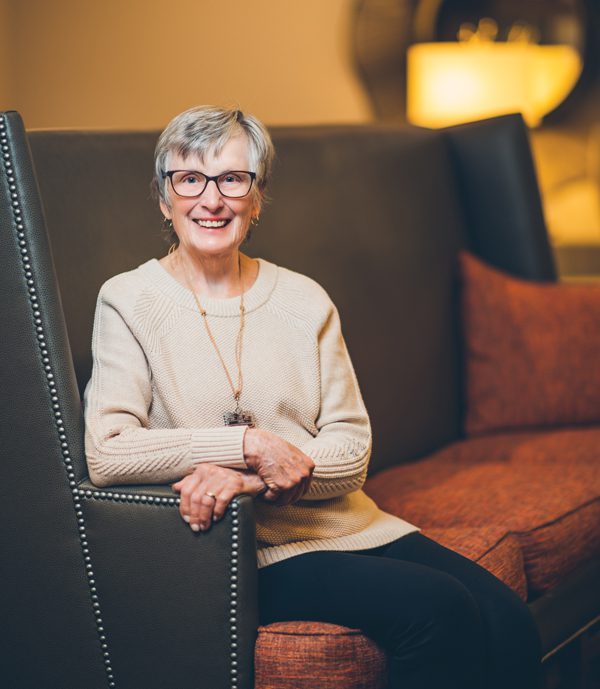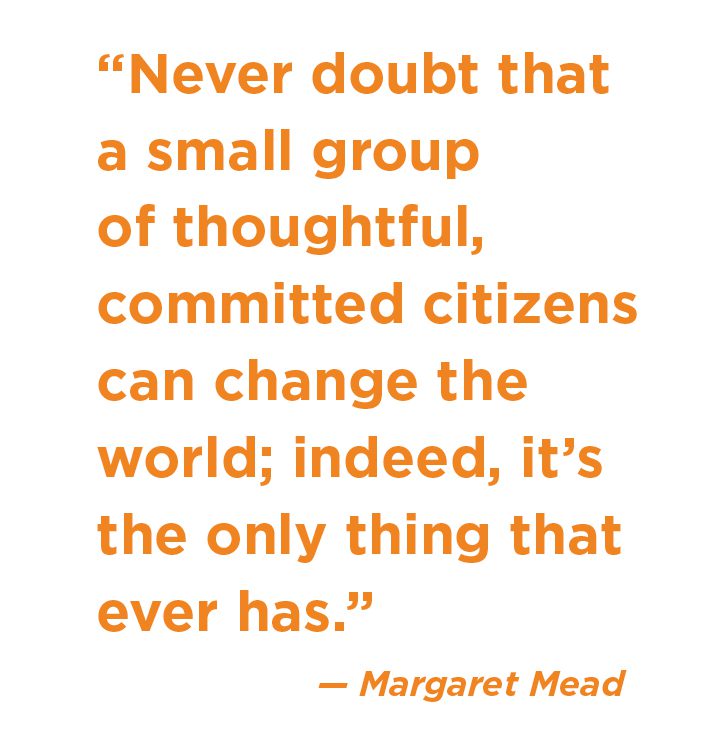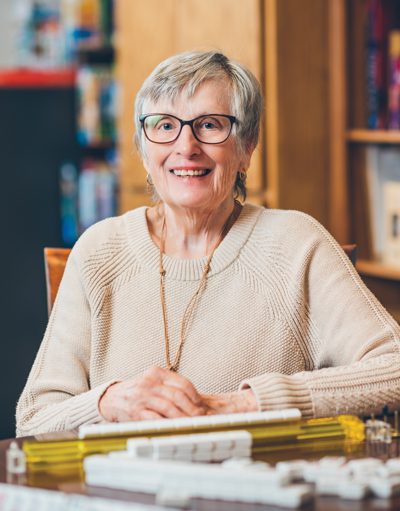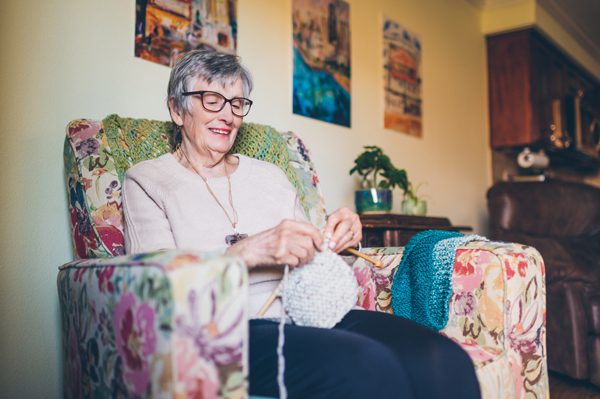 Reading books changed Grace Donoho’s life. Growing up in Chicago, she read voraciously. Her family lived in a bungalow her parents bought and fixed up in the Albany Park neighborhood. They often walked to the local library, and she recalls when she, her older sister and younger brother got their own library cards. She signed her name using the librarian’s ink well pen, leaving blotches of ink on the card.
Reading books changed Grace Donoho’s life. Growing up in Chicago, she read voraciously. Her family lived in a bungalow her parents bought and fixed up in the Albany Park neighborhood. They often walked to the local library, and she recalls when she, her older sister and younger brother got their own library cards. She signed her name using the librarian’s ink well pen, leaving blotches of ink on the card.
Her father read the daily newspaper cover to cover, while her mother zipped through books. Donoho perched on a ledge of their front porch, devouring her library books. “I would just sit there and read for hours. I loved sitting there,” she said.
Her parents also encouraged their children to explore the many museums and other cultural spots in the city. Her father wrote detailed instructions on index cards. “So, we could always, from early on, navigate around Chicago,” she said.
When Grace’s sister was in the children’s cardiac hospital with rheumatic fever, their parents dropped her and her brother off at the Museum of Science and Industry for hours. The youngsters started directing informal tours for other visitors. “We just knew everything in that museum, every nook and cranny,” she said.
They lived in a predominantly Jewish neighborhood and walked to school. Donoho’s eighth-grade teacher received permission for her students to read The Diary of a Young Girl by Anne Frank. “And that was such an eye-opener for me,” she said.
Grace was about the same age as Anne was, and she lived in a neighborhood among Holocaust survivors. She wondered, “How could I survive that, much less document it?”
After high school, Donoho received a scholarship to Northern Illinois University at DeKalb, and she took her suitcase on a Greyhound bus to register. She chose to major in home economics education and lived in Baptist Student Foundation housing.
She married during her junior year of college — to a friend of a friend — but they didn’t have children for another six years. Her husband quit teaching and bought a Snap-on Tools dealership in Northwest Arkansas.
Pursuing Her Passion
 They moved to Springdale right before Christmas in 1975. At first, Donoho volunteered at a local elementary school, and then decided to take courses at the University of Arkansas. She enrolled in graduate school at the encouragement of the head of the Instructional Resources Department, and she was awarded a graduate assistantship.
They moved to Springdale right before Christmas in 1975. At first, Donoho volunteered at a local elementary school, and then decided to take courses at the University of Arkansas. She enrolled in graduate school at the encouragement of the head of the Instructional Resources Department, and she was awarded a graduate assistantship.
Donoho found her passion. The program received an early Apple computer, and this was the beginning of incorporating computer technology into education.
She also learned about photography and video production and applied that knowledge when she was hired as a library media specialist at R.E. Baker Elementary School in Bentonville. If students wanted to learn photography or video production, she steered them to print resources where they could learn more about the things they might photograph or videotape.
“I loved getting non-readers into the library media center through media,” she said.
Donoho followed her principal when he moved to Old High Elementary School, where the library media center was in a separate building adjacent to the cafeteria. One day after school, she went into the small restroom off her office, and the lock broke. She tried to pick the lock using a piece of wire from the mirror, and she climbed on the commode and sink to attempt an escape through the ceiling. Nothing worked, and Grace was stuck for four hours.
That evening, a teacher on the way to a PTA meeting in the cafeteria saw the library media center lights still on and stopped in to check on her, managing to successfully open the door. That story is still recounted in the school, as her granddaughter, Isabella, heard it when she was an elementary student.
Advocating For Others

In the mid-1980s, Donoho became the media specialist for the Northwest Arkansas Education Service Cooperative, which served 18 school districts and private schools, with 4,000 teachers and 47,000 students. She initiated annual writers’ conferences for junior and senior high school students, brought in international authors, developed workshops to encourage student participation in media productions, organized student media awards banquets, and held workshops for school library media specialists.
It was here that Grace had the idea to develop a teacher training session for Holocaust education. From 1933 to 1945, 6 million Jews and 5 million others died under Nazi Germany’s state-sponsored persecution. Yet, she hadn’t learned about this horrific act of genocide in Chicago schools — other than reading Anne Frank’s diary — and her children hadn’t either in Arkansas schools.
In the mid-1990s, Donoho founded the Arkansas Holocaust Education Committee, a nonprofit organization. She invited the director of education from the United States Holocaust Memorial Museum in Washington, D.C., to speak at the first conference. With support from the Jewish Federation of Arkansas, the Arkansas Humanities Council and the Rockefeller Foundation, they continued the conference each year and also opened it to student participants. Holocaust survivors were among the speakers. In later years, their outreach expanded to Holocaust education events offered during an entire week.
“It was really exciting, and we realized that we needed to do more,” Donoho said.
For more than 25 years, she worked alongside others to establish Holocaust education for educators and students in Arkansas. And following Donoho’s retirement in 2009, others continue this work.
While advocating for Holocaust education, Grace took a new job at the Jones Center for Families just when it was opening in 1995 in Springdale. She interviewed for the director of education position with the philanthropist Bernice Jones at her kitchen table. Jones asked about Donoho’s personal life, and she explained that she was raising two daughters alone and had had to seek help from the women’s shelter. Grace and her daughters Amy and Julie later gave back by volunteering at the shelter. She also completed her doctorate in adult education at the UA while working at the Jones Center.
At the Jones Center, Donoho became interested in frequent visitors who’d relocated to Northwest Arkansas from the Republic of the Marshall Islands. She learned more about them and their needs, and she offered to tutor them to prepare for the written part of the drivers’ test. She saw how hard they were working to integrate into the community.
“It takes a real strong person to leave the comforts of home, and their environment, and pack up and go somewhere else,” she said.
Donoho served two terms as a commissioner for the Arkansas Minority Health Commission, and created an acculturation book for the Marshallese community – making it available in English and Marshallese, in both printed form and online.
While at the Jones Center, she also worked with area health providers on a sub-grant awarded by the Centers for Disease Control and Prevention and the Arkansas Department of Health to survey Marshallese residents regarding their health issues and barriers to health care. Surveys were created in English and Marshallese, and she hired Marshallese community members to help conduct the survey, which was focused on learning barriers to health care.

A Lifelong Learner
In 2006, Donoho had a ruptured brain aneurysm while working in her yard and experienced her first helicopter ride to UAMS in Little Rock. After she recovered, she decided to retire early so she could spend quality time with her young granddaughter. The two of them went on adventures and did projects. On one occasion they took a bus to Dickson Street Bookshop in Fayetteville for books on lighthouses, and later they made a lighthouse from marshmallow Rice Krispies and licorice ropes while watching Pete’s Dragon.”
Donoho was first smitten with Butterfield Trail Village back when one of her graduate school classes visited and toured. She eventually moved there, and her apartment is filled with books and yarn.
Donoho and a friend now residing at BTV taught knitting classes at a women’s detention center. Knitting offers the women a tool to manage stress and teaches a lifelong skill. The students made small bunny blankets for children at Mercy hospital and slippers for residents at the local women’s shelter.
Today she helps welcome new BTV residents, is taking a stained-glass class and plays Mah Jongg. She likes to bake cakes and cookies for her friends in the health care section of BTV. The Village wellness coordinator encouraged her to take up walking and now she hikes with her significant other on the Razorback Greenway usually twice a day – logging five to eight miles daily. Residents at BTV share incredible life experiences which are exciting for her to learn while dining, hiking, participating in recreational activities and attending social events.
In retirement, Donoho has served on a statewide committee to require Holocaust education in Arkansas. Through this bipartisan, statewide initiative, the Legislature unanimously passed Senate Bill 160, and it was signed into law in April 2021. It requires that Holocaust education be taught in Arkansas public schools in fifth through 12th grades, starting in the 2022-23 school year.
“When you feel a calling to address an issue or problem in society that is not being addressed, you need to act on that calling and move forward,” she said.
